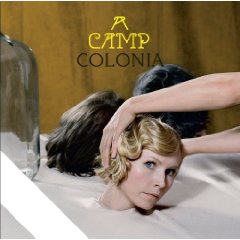Never underestimate the fascinating potency of the unorthodox collaboration: consider, if you will, the bar-raising bizarreness of the Motorhead-Nolans team-up, the dripping-from-the-speakers sexual chemistry of Nick’n’Kylie, or the world-devouring resistance-is-futile vitality of the Plant and Krauss pairing. Ostensibly, the teaming of the Cardigans’ Nina Persson with Sparklehorse’s Mark Linkous was similarly unforeseeable – both may have charmed their way into year-end best-of lists in the mid-90s, but she was the most unselfconsciously pop performer clasped to the bosoms of the New Underground’s raygun-and-hairslide-wielding adherents, while he, by contrast, surfed the plateau of the era’s obtuse post-Pavementalist wave. Still, as A Camp, they garnered greater plaudits than either has separately this decade, and, boldly, they’re threatening the memory of that golden one-night stand with what amounts to a renewed, full-blown affair.
Perhaps, then, it’s a wise manoeuvre for Linkous to downplay his contributions this time around, instead allowing time in the spotlight for a range of other performers – including, to up the unlikeliness quotient still further, the Smashing Pumpkins’ James Iha and the smashing Joan "As Police Woman" Wasser – but, in many ways, this is what may be regarded as, well, a Persson-al endeavour. Yes, the voice may still call to mind a pixieish redrawing of the Cadbury’s Caramel bunny, but there’s a steeliness at play here far removed from the woollier associations of Nina’s standard cohorts, and the lyrics are a catalogue of mature, melancholic reflection on failed commitments, increasing incomprehension, and a total remove from both modern life and previous priorities, as wonderfully evidenced by the complementary brace of ‘Here Are Many Wild Animals’ and ‘It’s Not Easy To Be Human’. Indeed, on ‘I Signed The Line’, we even get the fantastic couplet "Don’t give me platinum to weigh down my wrist / I’ve got injunctions, so cease and desist". It’d be enough to make you wonder what her husband makes of it all, were he not right there on the album with her. Now that’s just cold.
In fact, in some senses it’s a pity the music itself doesn’t consistently share this awkwardness of ambition. ‘Love Is Stronger Than Jesus’, for instance, is beset by a lowest-common-denominator lighters-aloft over-simplicity, while ‘The Weed Had Got There First’ is undercut by its laconic deliberation, and, to be honest, ‘Chinatown’ may be just a little too Dire Straits for some listeners’ palates. Thankfully, though, there are times when the terribly grown-up approach being taken reaps notable rewards; ‘Golden Teeth And Silver Medals’ rescues Nicolai Dunger from other-end-of-the-noughties obscurity for a stirring duet that calls to mind a liberated Tindersticks, and ‘Love Has Left The Room’ mines the kind of poignant retro seam in which Richard Hawley’s well and truly set up camp for some years now. And best of all, weirdly enough, is the startlingly stark and devastatingly abrupt piano-and-reverb wash of ‘Eau De Colonia’. Perhaps it’s fitting that this album’s highpoint should be one in which its chief protagonist is wholly unrecognisable, though – after all, ‘Colonia’ is an uneven endeavour that’s most effective when it’s the sound of a Cardigan unravelling.


